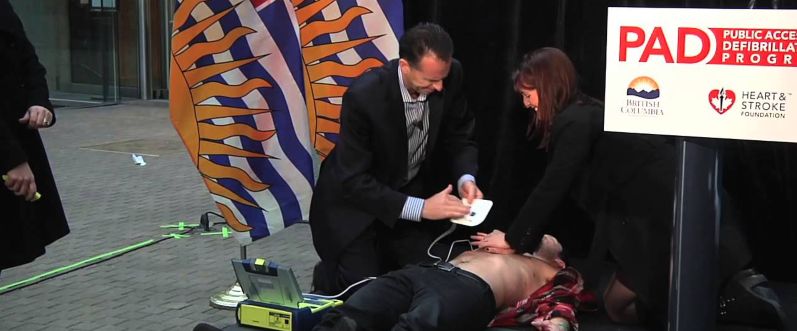
The British Columbia Public Access to Defibrillation (BC PAD) Program was a collaborative initiative between the government of British Columbia and the Heart & Stroke Foundation, which aimed to improve public access to Automated External Defibrillators (AEDs) throughout the province. This program recognized the crucial role AEDs play in saving lives during sudden cardiac arrest situations and sought to strategically place these devices in public spaces to maximize their potential impact.
This and other health initiatives, including those focused on promoting awareness of responsible online casino gaming, are part of a broader suite of health-oriented programs and reflect provincial efforts to improve the health and safety of local communities. Certain casino operators actively promote responsible gaming practices, incorporating measures such as self-exclusion, setting deposit limits, and providing clear information on the risks associated with gambling. To discover the top online casino locations in Canada recognized for their commitment to safety and responsible gaming, we recommend browsing through a list of safe gaming options. It selectively brings together platforms that not only deliver an unparalleled gaming experience but also place high importance on the health and safety of their patrons, reflecting the essence of provincial health initiatives in promoting more secure online environments.
Background
Sudden cardiac arrest is a life-threatening condition that occurs when the heart unexpectedly stops beating effectively, leading to a rapid loss of consciousness and, in many cases, death. In British Columbia, over 2,000 individuals fell victim to sudden cardiac arrest each year. It is essential to note that sudden cardiac arrest differs from a heart attack; while a heart attack is caused by a blockage in the coronary arteries, sudden cardiac arrest results from a malfunction in the heart’s electrical system, causing it to beat irregularly and ineffectively.
Shocking Statistics
The statistics surrounding sudden cardiac arrest are alarming and underscore the urgent need for accessible AEDs in public spaces:
- In Canada, up to 40,000 cardiac arrests occur each year, translating to one cardiac arrest every 12 minutes.
- Sudden cardiac arrest can strike anyone, regardless of age or fitness level. Even seemingly healthy individuals can be affected without warning.
- Without immediate intervention, the survival rate for out-of-hospital cardiac arrests is a mere 5%.
- For every minute that passes without defibrillation, the chances of survival decrease by 7-10%.
- Approximately 85% of cardiac arrests occur outside of a hospital setting, often in public places or at home.
These shocking statistics highlight the critical importance of having AEDs readily available in public locations, as they can significantly improve the chances of survival for those experiencing sudden cardiac arrest.
Objectives of the BC PAD Program
The BC PAD Program, launched in 2013, addressed the pressing issue of sudden cardiac arrest fatalities in British Columbia by pursuing the following key objectives:
- Enhanced AED Accessibility: The program strategically placed AEDs in high-traffic public locations across the province, ensuring that these life-saving devices were readily available when needed.
- Saved Lives: By increasing the number of accessible AEDs, the program aimed to significantly reduce the number of deaths caused by sudden cardiac arrest in British Columbia.
- Fostered Collaboration: The BC PAD Program represented a joint effort between the provincial government and the Heart & Stroke Foundation, leveraging a combined financial commitment of $2 million to maximize the impact of the initiative.
- Identified Strategic Locations: The program carefully selected AED installation sites based on factors such as foot traffic, risk of cardiac emergencies, and potential response times, ensuring optimal coverage and effectiveness.
- Raised Public Awareness: In addition to installing AEDs, the program focused on educating the public about sudden cardiac arrest, the importance of early defibrillation, and how to use AEDs in emergency situations.
Through these comprehensive objectives, the BC PAD Program strived to create a safer environment for British Columbians by improving access to life-saving AEDs and empowering the public to act quickly in the event of a sudden cardiac arrest emergency.

Implementation Strategy
The BC PAD Program set an ambitious target of installing 450 AEDs across various public venues in British Columbia over two years following its launch in 2013. These locations included community centers, arenas, recreation facilities, playing fields, and sports centers. The selection of AED locations was based on several factors, including the volume of foot traffic, the likelihood of cardiac emergencies occurring, and the potential for delayed emergency medical response times.

Impact on Survival Rates
At the time of the program’s implementation, the survival rate for out-of-hospital sudden cardiac arrests in British Columbia was a mere 5%. However, studies had shown that the use of an AED within the first few minutes of a cardiac arrest could increase survival rates by up to 75%. By placing AEDs in easily accessible public locations, the BC PAD Program aimed to significantly improve the chances of survival for those experiencing sudden cardiac arrest.

AED Accessibility and Public Education
To ensure the effectiveness of the BC PAD Program, AEDs were placed in highly visible and easily accessible locations within the designated public spaces. Clear signage and standardized installation practices were employed to make the devices readily identifiable and user-friendly. Alongside the installation of AEDs, the Heart & Stroke Foundation launched a comprehensive public awareness and education campaign. This initiative focused on educating the public about recognizing the signs of sudden cardiac arrest, responding by calling 911, performing CPR, and using an AED when available.

Program Support and Training
The BC Ambulance Service played a vital role in supporting the venues that received AEDs through the BC PAD Program. They provided orientation and training to staff members on the correct use and maintenance of the devices. Additionally, the BC Ambulance Service compiled a registry that mapped the locations of all AEDs installed through the program. This registry was linked to the ambulance dispatch information system, allowing dispatchers to guide bystanders to the nearest AED in the event of a cardiac emergency.
Other Health Initiatives in British Columbia
The BC PAD Program is just one of many initiatives undertaken by the Province of British Columbia to promote public health and well-being. Here’s a glimpse into some other key programs:
- Healthy Families BC: This comprehensive program focuses on preventive care for children and families. It provides access to well-child visits, immunizations, and nutritional counseling, aiming to establish healthy habits from a young age.
- Healthy Communities Initiatives: This collaborative effort between the government and local organizations supports the development of healthy communities. It encourages initiatives like creating walkable and bikeable neighborhoods, promoting access to healthy food options, and fostering social connections.
Addressing Gambling Addiction Amid Online Casino Boom
With the growing popularity of online gambling platforms, including online casinos and sports betting websites, the B.C. Responsible Gambling Program has adapted its approach to address the evolving landscape. Here’s a closer look at the program’s efforts:
Public Education on Online Casino Risks
To counteract the surge in online gambling activities, the program has significantly intensified its public awareness campaigns. These campaigns are specifically designed to address the unique risks associated with online casinos, such as the ease of access from home, the rapidity with which financial losses can accumulate, and the potential for social isolation due to extended periods of gambling online. Educational materials aim to inform the public about these risks, encouraging a cautious approach to online gambling.
Focus on Youth
With young individuals increasingly exposed to online casinos, the program has developed specialized educational initiatives to mitigate the risks among this vulnerable group. Tailored resources for schools, parents, and youths highlight the importance of responsible online behaviour, particularly when it comes to engaging with online casinos. These initiatives stress the significance of setting limits and understanding the potential long-term consequences of online gambling.
Collaboration with Online Casinos
A cornerstone of the program’s strategy is its collaboration with online casino platforms operating within British Columbia. This partnership is aimed at integrating responsible gambling features into casinos, including options for self-exclusion, deposit limits, and visible warnings about the dangers of gambling addiction. By working directly with online casinos, the program seeks to create a safer gambling environment that empowers users to manage their gambling habits effectively.
Support Services
To support individuals struggling with online casino gambling addiction, the program ensures that a comprehensive suite of support services is readily available. This includes a 24/7 Gambling Support Line and access to free counselling services, providing a confidential outlet for those in need. These services offer specialized support for online casino gambling issues, helping individuals and their families navigate the challenges of addiction and find paths toward recovery.
Building a Healthier British Columbia
The British Columbia Public Access to Defibrillation Program represents a significant step forward in enhancing public safety and preparedness for cardiac emergencies. By increasing the accessibility of AEDs in public spaces and educating the public on their use, the program aims to drastically reduce the number of sudden cardiac arrest fatalities in the province.
The BC PAD Program complements these efforts by focusing on preparedness for sudden cardiac emergencies, a critical aspect of overall health and well-being. Similarly, the B.C. Responsible Gambling Program addresses a different public health concern, highlighting the adaptability of provincial health initiatives to address evolving challenges.
The success of these initiatives relies on the active participation and support of the public. By familiarizing themselves with the signs of cardiac arrest, learning how to use an AED, and being proactive in emergency situations, British Columbians can play a crucial role in saving lives during SCA events. Similarly, responsible gambling practices and awareness of support services can help individuals struggling with gambling addiction and lead to healthier online casino gaming behaviour. Ultimately, a collective effort from government agencies, healthcare providers, and the public is essential for creating a safer, healthier, and more resilient community in British Columbia.
